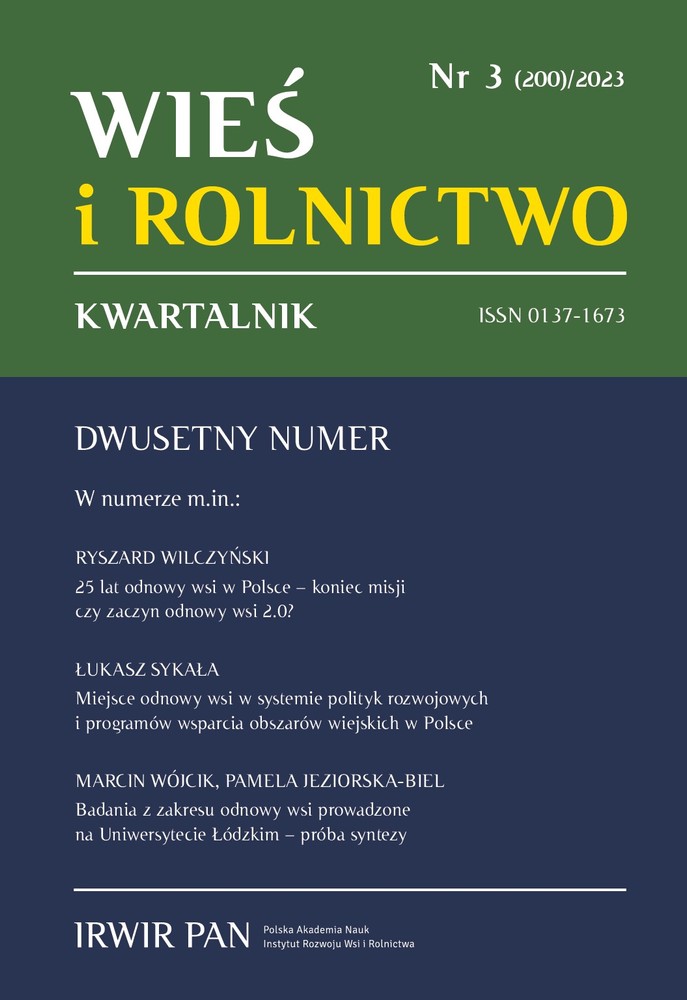Social Innovations and the Inclusion of Rural Residents in the Process of Rural Renewal
DOI:
https://doi.org/10.53098/wir.2023.3.200/08Keywords:
rural renewal, social innovation, public institutions, involving residentsAbstract
One of the goals of rural renewal is to involve residents in the process of its transformation. Not only projects financed (in recent years) from the funds of the rural development programmes, but also others, including those projects that can be described as social innovations, can contribute to its implementation. The aim of the article was to show the relationship between the implementation of social innovations by rural public institutions and the implementation one of the goals of rural renewal. The article presented the results of a study conducted on a random sample of 330 public institutions from rural municipalities. Selected empirical data obtained through the implementation of an online survey and two examples of implemented social innovations (identified thanks to unstructured interviews with representatives of public institutions) were analysed. Institutions that implemented social innovations were characterised by a higher level of involvement of residents in activities aimed at solving social problems affecting them. They involved residents in various stages of social innovation implementation, going beyond the scheme in which public institution provide the service, and residents used them. Social innovations contributed to the goal of rural renewal, which is to involve residents in the process of solving social problems.
References
Bendyk E. (2022). Dobrze już było. I co dalej? W: A. Żaczek-Żmijewska (red.). Zaprojektuj rozwiązanie. Inspiracje dla władz lokalnych (s. 6–7). Warszawa: Fundacja Batorego.
Davies A., Simon J. (2012). The value and role of citizen engagement in social innovation. A deliverable of the project: “The theoretical, empirical and policy foundations for building social innovation in Europe” (TEPSIE). European Commission – 7th Framework Programme. Brussels: European Commission, DG Research.
Feliksiak M. (2022). Aktywność w organizacjach obywatelskich. Komunikat z badań CBOS, 41.
Halamska M. (2018). Wspierać czy zalesiać? Dylematy rozwoju wiejskich obszarów problemowych. Wieś i Rolnictwo, 3 (180), 69–91. DOI: https://doi.org/10.53098/wir032018/03
Heffner K. (2007). Fundamenty procesu przemian aktywizacyjnych na obszarach wiejskich. W: M. Kłodziński, M. Błąd., R. Wilczyński (red.). Odnowa wsi w integrującej się Europie (s. 51–66). Warszawa: Instytut Rozwoju Wsi i Rolnictwa PAN.
Jeziorska-Biel P., Wójcik M. (2017). Społeczne i przestrzenne aspekty procesu odnowy wsi (przypadek województwa łódzkiego). Biuletyn Komitetu Przestrzennego Zagospodarowania Kraju Polskiej Akademii Nauk, 267, 121–132.
Kaleta A. (2007). Odnowa wsi z perspektywy historycznej. W: M. Kłodziński, M. Błąd, R. Wilczyński (red.). Odnowa wsi w integrującej się Europie (s. 77–86). Warszawa: Instytut Rozwoju Wsi i Rolnictwa PAN.
Kaleta A. (1992). Podstawowe założenia odnowy obszarów wiejskich Europy. W: M. Wieruszewska (red.). Odnowa wsi. Między mitem a nadzieją (s. 5–17). Warszawa: Instytut Rozwoju Wsi i Rolnictwa PAN.
Kamiński R. (2013). Czy rozwój infrastruktury społecznej wystarczy do wzrostu kapitału społecznego i aktywizacji polskiej wsi? Acta Universitatis Lodziensis. Folia Sociologica, 44, 173–185.
Kamiński R. (2007). Odnowa wsi i LEADER. Komplementarność metod rozwoju obszarów wiejskich. W: M. Kłodziński, M. Błąd., R. Wilczyński (red.). Odnowa wsi w integrującej się Europie (s. 165–180). Warszawa: Instytut Rozwoju Wsi i Rolnictwa PAN.
Kazepov Y., Colombo F., Sarius T. (2020a). On elephants, butterflies and lions: Social protection, innovation and investment. W: S. Oosterlynck, A. Novy, Y. Kazepov (red.). Local Social Innovation to Combat Poverty and Exclusion: A Critical Appraisal (s. 43–62). Bristol: Policy Press. DOI: https://doi.org/10.1332/policypress/9781447338444.003.0003
Kazepov Y., Colombo F., Sarius T. (2020b). The multi-scalar puzzle of social innovation. W: S. Oosterlynck, A. Novy, Y. Kazepov (red.). Local Social Innovation to Combat Poverty and Exclusion: A Critical Appraisal (s. 91–112). Bristol: Policy Press. DOI: https://doi.org/10.1332/policypress/9781447338444.003.0005
Krasnopolskaya I., Meijs L. (2019). The effect of enabling factors on social innovation in Russian non-profit organisations. International Journal of Sociology and Social Policy, 39 (5/6), 447–463. DOI: https://doi.org/10.1108/IJSSP-09-2018-0140
Leszczyński A. (2020). Ludowa historia Polski. Warszawa: Wydawnictwo W.A.B.
Marques P., Morgan K., Richardson R. (2017). Social innovation in question: The theoretical and practical implications of a contested concept. Environment and Planning C: Politics and Space, 36 (3), 496–512. DOI: https://doi.org/10.1177/2399654417717986
Michalska S., Zajda K. (2011). Trajektorie wykorzystania zasobów lokalnych w procesie rozwoju partnerstw terytorialnych. Case study lokalnych grup działania „Dolina Karpia” oraz „Kraina Rawki”. Wieś i Rolnictwo, 4 (153), 123–138.
Misztal W. (2015). Dialog obywatelski i innowacyjny rozwój demokracji. W: W. Misztal, A. Kościański, G. Chimiak (red.). Obywatele wobec kryzysu. Uśpieni czy innowatorzy (s. 117–128). Warszawa: Wydawnictwo Instytutu Filozofii i Socjologii PAN.
Miś L. (2008). Konstruktywizm/konstrukcjonizm w socjologii, pracy socjalnej i terapii. W: L. Miś (red.). Praca socjalna skoncentrowana na rozwiązaniach (s. 27–47). Kraków: Instytut Socjologii Uniwersytetu Jagiellońskiego.
Piszczek E., Knieć W., Marcysiak T. (2022). Obywatelskość na peryferiach. Kondycja wiejskich organizacji pozarządowych w opinii jej liderów. Warszawa: Narodowy Instytut Wolności.
Pospěch P. (2014). Discursive no man’s land: Analysing the discourse of the rural in the transitional Czech Republic. Journal of Rural Studies, 34, 96–107. DOI: https://doi.org/10.1016/j.jrurstud.2014.01.006
Spacek M., Perlik M., Brnkalakova S., Kluvankova T., Valero D., Nijnik M., Melnykovych M., Lukesch R., Sarkki S. (2021). Social innovation for sustainability transformation and its diverging development paths in marginalised areas. Sociologia Ruralis, 61, 344–371. DOI: https://doi.org/10.1111/soru.12337
Wilczyński R. (2007). 10 lat odnowy wsi w Polsce – droga do celu. W: M. Kłodziński, M. Błąd, R. Wilczyński (red.). Odnowa wsi w integrującej się Europie (s. 67–76). Warszawa: Instytut Rozwoju Wsi i Rolnictwa PAN.
Wolski O. (2018). Problem (nie)innowacyjności w projektach odnowy wsi. Acta Universitatis Lodziensis. Folia Geographica Socio-Oeconomica, 31, 17–37. DOI: https://doi.org/10.18778/1508-1117.31.02
Wolski O. (2017). Odnowa wsi jako przedmiot badań. Ewolucja i systematyzacja pojęcia. Wieś i Rolnictwo, 2 (175), 119–145. DOI: https://doi.org/10.53098/wir022017/06
Zajda K. (2022a). Współpraca podmiotów lokalnej polityki społecznej a systemy innowacji społecznych w gminach wiejskich. Wieś i Rolnictwo, 1 (194), 41–55. DOI: https://doi.org/10.53098/wir012022/02
Zajda K. (2022b). Wdrażanie innowacji społecznych przez wiejskie organizacje pozarządowe i lokalne grupy działania. Łódź: Wydawnictwo Uniwersytetu Łódzkiego.
Zajda K., Mazurek D. (2022). Public Institutions and NGOs Cooperation for Social Innovations in Post-Socialist Rural Poland. Eastern European Countryside, 14 (4), 623–637. DOI: https://doi.org/10.2478/euco-2022-0031







